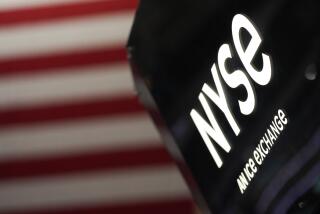Business Briefing
- Share via
Venezuelan currency is devalued
Venezuelan President Hugo Chavez announced a currency devaluation as the nation struggles with recession and 25% inflation, the highest in Latin America.
Chavez said Venezuela’s currency, the bolivar, will now have two government-set rates depending on the use, either 2.60 to the U.S. dollar for transactions deemed priorities by the government or 4.30 to the dollar for other transactions.
The currency’s official exchange rate had been held steady by the government at 2.15 bolivars to the dollar since the last devaluation in 2005. Friday’s devaluation dropped the bolivar’s value by 17% or 50%, depending on the tier.
Chavez said the priority rate would be allotted for food items, healthcare products, school supplies, machinery and equipment for economic development, among other things.
He said the new rates were aimed at “braking imports that aren’t strictly necessary and stimulating export policy.”
CAPITOL HILL
Geithner to be grilled on secrecy
Treasury Secretary Timothy F. Geithner will face a congressional grilling this month about the suppression of details on deals that funneled billions to investment banks while he was president of the Federal Reserve Bank of New York.
Lawmakers reacted angrily to revelations in e-mails sent in late 2008 and early 2009 between lawyers for the New York Fed and American International Group Inc. The exchanges show the New York Fed wanted AIG to withhold information about deals that sent billions from the taxpayer bailout of AIG to Goldman Sachs Group Inc., Societe Generale and other major banks.
“The lack of transparency and accountability is disturbing enough, but the outstanding question is why the [New York Fed] didn’t fight for a better deal for the American taxpayer,” said Rep. Darrell Issa of Vista, Calif., top Republican on the House Committee on Oversight and Government Reform.
THE ECONOMY
U.S. consumers again borrow less
Americans borrowed less for a 10th month in November, with total credit and borrowing on credit cards falling by the largest amounts on records that go back nearly seven decades. The dramatic declines raised new worries about whether consumers will cut back further on spending, making it harder for the economy to mount a sustained rebound.
The Federal Reserve said total borrowing fell $17.5 billion in November, a much bigger decline than the $5-billion drop economists had expected.
-- times wire reports
More to Read
Sign up for Essential California
The most important California stories and recommendations in your inbox every morning.
You may occasionally receive promotional content from the Los Angeles Times.












